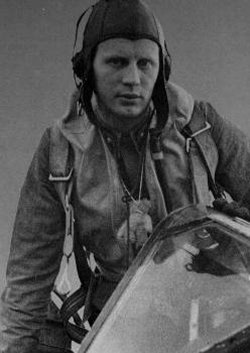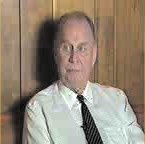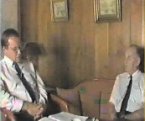The interview
 …Yes, and there were victories as well… You might have had far more than 30 kills already at the stage when on the 31st July you was awarded the Mannerheim Cross. Do you remember anything of this, did it come as a surprise and where were you then?
…Yes, and there were victories as well… You might have had far more than 30 kills already at the stage when on the 31st July you was awarded the Mannerheim Cross. Do you remember anything of this, did it come as a surprise and where were you then?
A: No, it didn't come as a surprise. I was here in Helsinki on a two-day leave when it happened, when I was notified about having been nominated as a Knight. And the decoration was to be fetched from Mikkeli. The ceremony of awarding the decorations always took place on the schoolyard of the local elementary school, as the General Headquarters was in Mikkeli. Marski [respectful name for the Marshal] himself mostly performed it but for example when I got it, he was sick then, unable to do it, but [General] Heinrichs delivered the decorations. He did participate in the lunch at Hotel Kaleva though. There was always a lunch after such an occasion, and he delivered a brief speech there.
There were no pilots present other than me. Most of the awarded ones were long range commandos [kaukopartiomies, a ranger operating for weeks behind enemy lines], who had returned home from their long journeys and then been driven to Mikkeli in a great hurry. Even so tired that a few of them fell under the table although alcohol had nothing to do with it whatsoever. Simply, the lack of sleep, and their need of sleep was so great. They had been taken there directly from wherever up there, and anyone knows that as they made journeys lasting even months or several weeks, so it wasn't anything pleasant.
A man must be tired to fall asleep at the Marshal's table...
A: You bet!
Was there ever discussion about why there were so few of these fighter aircraft and why they came so late?
A: It was a question of money. The 1930's were such an unfortunate decade. The Marshal, this gentleman [pictured on the screen], was the Chairman of the Council of Defence during all the 30's, and then Lieutenant Colonel Airo was the Secretary. Both of them were very hard proponents of the acquisition of aircraft, but the political circles did not agree to it. That is why, at the outbreak of the Winter War, unless we had got these 34 Dutch Fokker D.XXI aircraft in the spring of 1939, we would have been completely lost. We would not have had a single combat capable plane without them.
It was not until then when they woke up, in the days of the Winter War, even the Cabinet, who were expelled to the province of Ostrobothnia. Maybe that was the enlightening spark so that our Military Attache to Washington, Colonel Zilliacus, received an urgent order to try to get us airplanes even by force. And after many turns of events, these Brewsters were then finally received.
The only limit about the number of planes shot down, to be awarded a Mannerheim Cross, may have been the minimum requirement of 30 kills?
A: Well, that wasn't really any criterion as such, but that in fact may have been the requirement, approximately the number of around thirty, in order for a fighter pilot to be proposed the Mannerheim Cross.
 Do you remember how many of these fighter Knights were there in Finland?
Do you remember how many of these fighter Knights were there in Finland?
A: Nineteen. Not today any more, of course…
And of these, two were Double Mannerheim Cross Knights, you and…
A: …and Flight Master Sergeant Eino Ilmari Juutilainen. He still lives here in Helsinki, or in Riihikallio outside Helsinki.
Yes, he does indeed. -You officially shot down 75 planes, and the Finnish kills altogether were more than 1800. Thus, your share of them was a fairly big one?
A: Well yes, but this was much because I was always in the position of a leader, so I could choose when I wanted to fly. Obviously, although I have no more than 627 flight hours, I still did fly more than many, many others.
And wasn't there really such a competition about who got to fly, so obviously there were pilots enough but there was not a sufficient number of planes?
A: Not enough planes. Say, of a Squadron with 38 planes, of those always at least two planes were being serviced. And this way, open situations occurred.
Those 627 war flight hours must certainly include many different kinds of flights. Would you remember any special one that you could now tell about?
A: From the historical viewpoint, say, the most exciting flight took place on 4th June 1942. That day was Marshal Mannerheim's 75th anniversary, and he had travelled to Immola by his special train, to receive congratulations from high military persons coming from Germany.
Of course, nothing was told about who these military persons were, but what was known: on the previous day we had received an urgent message to Hirvas - as we were then still deployed at Hirvas airfield in Eastern Karelia - that I must come with six planes with a great hurry, and I must be on the morning of the 4th day at Immola airfield for a special mission. There Lieutenant Colonel Nuotio gave me this mission. We were to fly to Lääveri in Estonia, at Tallinn to meet a four-engined Focke-Wulf Condor special aircraft coming from Germany, and we were to escort it intact to Immola airfield, which is to the field where I had taken off.
 This is what then happened; but we did wonder very much why 30 Messerschmitt escort fighters were needed for such a single four-engined airplane to escort it. We started to return back towards the east, and the cloud base kept lowering all the time. Over Lahti, it was only 200 meters. We came over Kaukopää, and it was less than 100 meters. In Kaukopää, there is a very high chimney of a factory. And this Focke-Wulf Condor, flown by its 51-year old personal pilot of the guest, it flew so close to the Kaukopää chimney that the distance was no more than twenty meters at most. He simply failed to notice that chimney, as it was partially inside the cloud.
This is what then happened; but we did wonder very much why 30 Messerschmitt escort fighters were needed for such a single four-engined airplane to escort it. We started to return back towards the east, and the cloud base kept lowering all the time. Over Lahti, it was only 200 meters. We came over Kaukopää, and it was less than 100 meters. In Kaukopää, there is a very high chimney of a factory. And this Focke-Wulf Condor, flown by its 51-year old personal pilot of the guest, it flew so close to the Kaukopää chimney that the distance was no more than twenty meters at most. He simply failed to notice that chimney, as it was partially inside the cloud.
However, fortunately nothing happened - or unfortunately maybe - finally the plane got to Immola airfield. Immola airfield is relatively small for such a large plane, so he needed to use the full brakes. The left brake
cylinder lit up in fire, and it was then successfully extinguished. And when the plane finally came to a halt, so who else was it that came out of the plane than "Aatu" Hitler, Adolf Hitler. He had himself personally come to congratulate Marshal Mannerheim.
Of course, Marshal Mannerheim and the highest General Staff knew this, who is coming. They had then lunch in his salon carriage, and meanwhile the brake was repaired. And thereafter Adolf Hitler started his way back to Germany, after having presented before that an armoured Messershmitt car [a slip of tongue, meaning really Mercedes] as a gift from this trip.
Historically it can be asked, what ever might have happened if then, at such an early stage as June 1942, this plane had collided with the chimney, and been destroyed with Hitler aboard. It could have changed the pages of history to look entirely different from what they are today. In that respect this was a most interesting mission.
[End of video interview]
| 
 This is the transcript of video interview of the Finnish fighter pilot Hans "Hasse" Erik Wind, double recipient of the Mannerheim Cross and ace of 75 victories. Interview was done by colonel Jouko Liusvaara in 1988, when Hans Wind was 69 years of age. Mr. Liusvaara granted Virtuaalilentäjät - Virtual Pilots ry the permission to publish the transcript in the association's history web site.
This is the transcript of video interview of the Finnish fighter pilot Hans "Hasse" Erik Wind, double recipient of the Mannerheim Cross and ace of 75 victories. Interview was done by colonel Jouko Liusvaara in 1988, when Hans Wind was 69 years of age. Mr. Liusvaara granted Virtuaalilentäjät - Virtual Pilots ry the permission to publish the transcript in the association's history web site.
 …Yes, and there were victories as well… You might have had far more than 30 kills already at the stage when on the 31st July you was awarded the Mannerheim Cross. Do you remember anything of this, did it come as a surprise and where were you then?
…Yes, and there were victories as well… You might have had far more than 30 kills already at the stage when on the 31st July you was awarded the Mannerheim Cross. Do you remember anything of this, did it come as a surprise and where were you then?
 Do you remember how many of these fighter Knights were there in Finland?
Do you remember how many of these fighter Knights were there in Finland?
 This is what then happened; but we did wonder very much why 30 Messerschmitt escort fighters were needed for such a single four-engined airplane to escort it. We started to return back towards the east, and the cloud base kept lowering all the time. Over Lahti, it was only 200 meters. We came over Kaukopää, and it was less than 100 meters. In Kaukopää, there is a very high chimney of a factory. And this Focke-Wulf Condor, flown by its 51-year old personal pilot of the guest, it flew so close to the Kaukopää chimney that the distance was no more than twenty meters at most. He simply failed to notice that chimney, as it was partially inside the cloud.
This is what then happened; but we did wonder very much why 30 Messerschmitt escort fighters were needed for such a single four-engined airplane to escort it. We started to return back towards the east, and the cloud base kept lowering all the time. Over Lahti, it was only 200 meters. We came over Kaukopää, and it was less than 100 meters. In Kaukopää, there is a very high chimney of a factory. And this Focke-Wulf Condor, flown by its 51-year old personal pilot of the guest, it flew so close to the Kaukopää chimney that the distance was no more than twenty meters at most. He simply failed to notice that chimney, as it was partially inside the cloud.